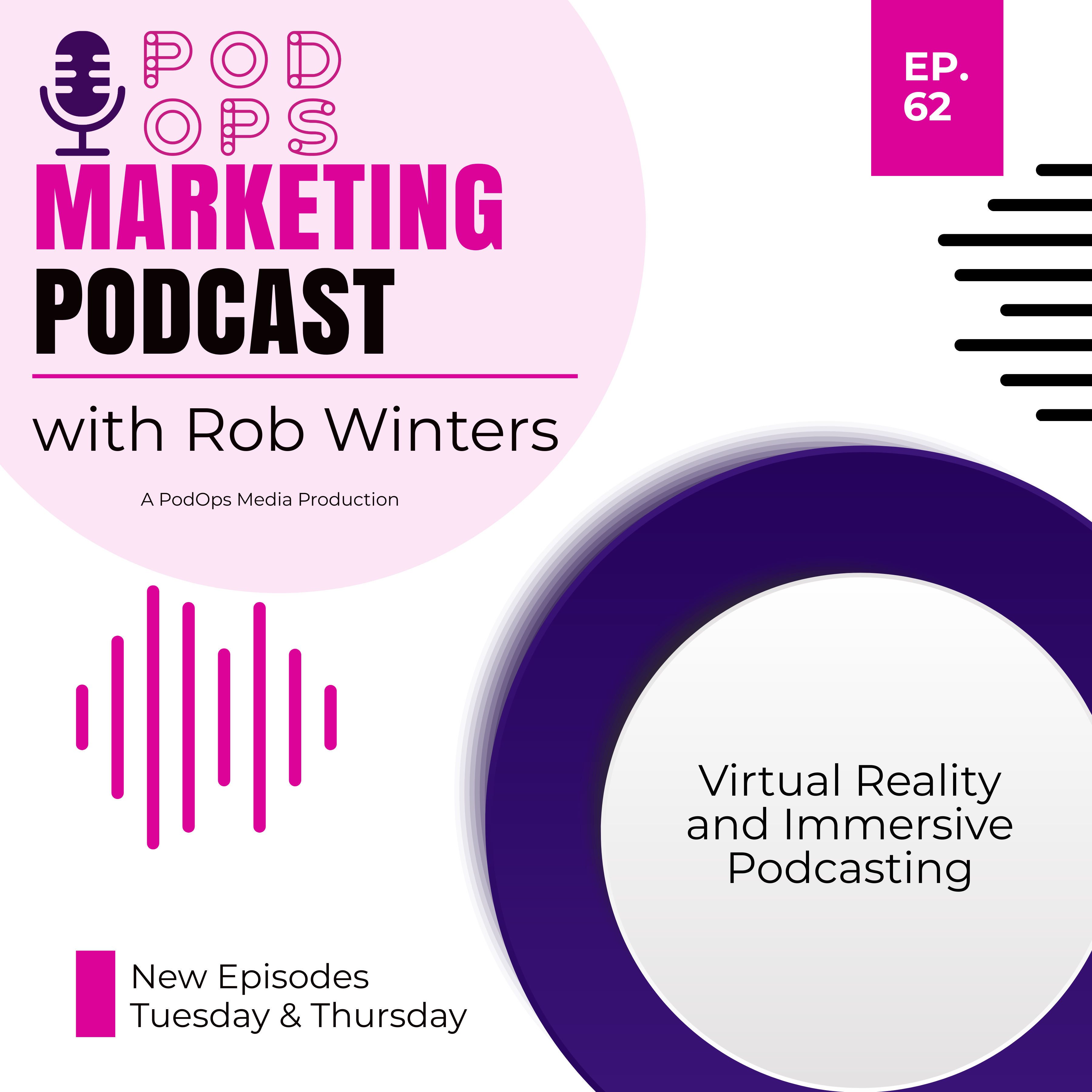

Virtual Reality and Immersive Podcasting
PodOps Media Marketing Podcast
| Rob Winters | Rating 0 (0) (0) |
| https://www.thepodops.com | Launched: Aug 22, 2023 |
| rob@thepodops.com | Season: 1 Episode: 61 |
Virtual Reality and Immersive Podcasting represent an exciting intersection between traditional audio content and cutting-edge technology. These approaches aim to create a more engaging and immersive experience for podcast listeners by incorporating elements of virtual reality and spatial audio. In this episode, Rob digs into the possibilities.
Virtual Reality and Immersive Podcasting represent an exciting intersection between traditional audio content and cutting-edge technology. These approaches aim to create a more engaging and immersive experience for podcast listeners by incorporating elements of virtual reality and spatial audio. In this episode, Rob digs into the possibilities.
Rob Winters: [00:00:00] This is the PodOps Media Podcast where we dive into marketing tips, tricks, and trends for entrepreneurs and small businesses. I'm your host, Rob Winters. Today's topic; Virtual Reality and Immersive Podcasting.
[00:00:13] Virtual reality and immersive podcasting represent an exciting intersection between traditional audio content and cutting-edge technology. These approaches aim to create a more engaging and immersive experience for podcast listeners by incorporating elements of virtual reality and spatial audio. Let's quickly define these terms.
[00:00:30] Virtual reality, or VR, involves creating a digital environment that simulates a realistic experience. Users wear a VR headset to immerse themselves in these virtual worlds, which can be interactive and three-dimensional. While traditionally associated with visual experiences, VR can also be utilized to enhance the auditory aspect of content, such as podcasts.
[00:00:49] Immersive podcasting takes advantage of spatial audio technology to create a more immersive listening experience. Spatial audio enables sound to be perceived from various directions and distances, mimicking how we hear sound in the real world. This technology enhances the sense of presence and depth in audio content.
[00:01:05] When VR and immersive podcasting are combined, creators can produce audio-rich environments that immerse listeners in a virtual space. For example, a historical podcast could transport listeners to a virtual reconstruction of a historical event or location as listeners move their hands or interact with the virtual environment; the audio adjusts accordingly, creating a dynamic and immersive experience.
[00:01:25] Here are some key features and potential benefits of VR and immersive podcasting.
[00:01:30] Enhanced Engagement: The immersive nature of VR and spatial audio can captivate listeners on a deeper level, making them feel like active participants rather than passive consumers.
[00:01:40] A multi-sensory experience: By leveraging spatial audio and potentially other sensory cues like haptic feedback, creators can stimulate multiple senses, creating a more holistic experience.
Rob Winters: [00:01:51] New narrative possibilities: Creators can experiment with new storytelling techniques that take advantage of these unique features of VR. This could include interactive branching narratives or stories that unfold in three-dimensional spaces.
[00:02:04] Brand differentiation: Embracing VR and immersive podcasting can set a podcast apart from others, attracting audiences interested in cutting-edge technology and novel experiences.
[00:02:14] There are some challenges and considerations to be aware of. These include:
[00:02:19] Accessibility: Not all listeners have access to VR headsets or devices capable of handling VR experiences, which could limit your potential audience.
[00:02:26] Also, technical expertise. Creating VR content requires technical expertise and resources, making it more challenging than traditional podcasting.
[00:02:35] Then there's content quality. While the technology can enhance the experience, the quality of audio content remains paramount. The content itself must be engaging and valuable to listeners.
[00:02:44] And finally, adoption and compatibility. The adoption of VR technology is still evolving, and creators need to consider compatibility with various VR platforms and devices.
[00:02:53] As technology continues to advance and VR becomes more accessible, the potential for immersive podcasting to reshape the podcast landscape is significant. However, creators should carefully assess their goals, target audience, and resources required before embarking on VR and immersive podcasting ventures.
[00:03:09] If given the opportunity, would you bring your podcast to a VR space? Let me know in the comments section of this episode at PodOpsHost.com/Tips.
[00:03:19] Thanks for listening. Be sure to subscribe at PodOpsHost.com/Tips To keep up with weekly Marketing tips.
















